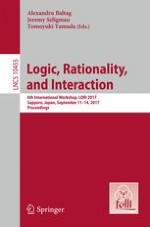2017 | OriginalPaper | Buchkapitel
Topo-Logic as a Dynamic-Epistemic Logic
verfasst von : Alexandru Baltag, Aybüke Özgün, Ana Lucia Vargas Sandoval
Erschienen in: Logic, Rationality, and Interaction
Verlag: Springer Berlin Heidelberg
Aktivieren Sie unsere intelligente Suche, um passende Fachinhalte oder Patente zu finden.
Wählen Sie Textabschnitte aus um mit Künstlicher Intelligenz passenden Patente zu finden. powered by
Markieren Sie Textabschnitte, um KI-gestützt weitere passende Inhalte zu finden. powered by
